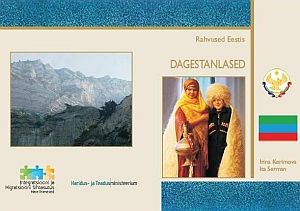Baltic States – CIS, Book review, Education and Science, Estonia, Integration
International Internet Magazine. Baltic States news & analytics
Wednesday, 24.12.2025, 16:06
Estonia's Integration Foundation presents book about the Dagistani
 Print version
Print version |
|---|
The aim of the book series commissioned by the Integration and Migration Foundation Our People (MISA) is to introduce Estonians to different nationalities living in their country. The collection introduces Dagestani culture, customs, national costumes, achievements in education and science, literature, art, music, theatre, beliefs, etc.
“For example, the book reveals the interesting bit of information that while Estonians have always prided themselves in their beautiful native language, the Dagestani are proud that they have several native languages. It is said that in Dagestan there are as many languages and people who speak these languages as there are auls,” Kaie Kullik, co-ordinator of the Multicultural Education Unit at MISA said.
“In addition to a population of three million in their homeland, another 700,000 Dagestanis are living abroad. There are about 1,500 Dagestanis currently living in Estonia. The reasons for their coming and going are varied – acquiring higher education or simply visiting relatives,” Kullik said.
According to her, it is interesting that the state located in the North Caucasus next to the Caspian Sea is one of the most multicultural regions, and Aghuls, Dargins, Kumyks as well as Laks, Lezgians, Tabasarans and Nogais are also considered Dagestanis.
Having been forced to survive in the face of harsh nature, constant battle for survival and endless wars, and standing up for their close ones, this mountain people has learned to recognise the price of bread and freedom. That is why one of the most ancient wishes of the Dagestini goes: “May your bread not be sweet, but always tasty!”
The books are meant to be used as supplementary material in general education schools and in history and social education classes. The print run of the book “The Dagestani” is 2,500 copies and the collection is traditionally handed out free of charge to general education schools and libraries.
Nine books have previously been published in the book series introducing the ethnic minorities living in Estonia – “Lithuanians”, “Kazakhs”, “Russians”, “Uzbekis”, “Azerbaijanis”, “Armenians”, “Chuvash”, “Belarusians” and “Ukranians”. The book “Dagestanis” will be the last in the series.
The book is edited by Irina Kerimova and Ita Serman. The book was published by Trükikoda Auratrükk and its publication was supported by the Ministry of Education and Science within the framework of the integration agenda of 2013.








 «The Baltic Course» Is Sold and Stays in Business!
«The Baltic Course» Is Sold and Stays in Business!

